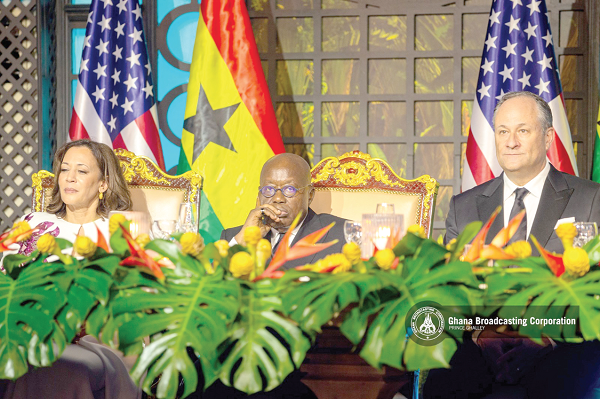
Harris to reframe US views on Africa, foster partnership
The First black female US Vice-President, Kamala Harris, began her three-nation Africa tour last Sunday, landing in Accra, Ghana, as part of a visit that includes stops in Tanzania and Zambia.
With fears of terrorism and Russian mercenaries rippling through West Africa, Vice-President Kamala Harris on Monday opened her week-long trip to the continent by vowing support for Ghana, a democratic pillar in the region that’s being squeezed by an economic crisis and security concerns.
The visit was a high-profile show of support for Ghanaian President Nana Akufo-Addo, who faces rising discontent over inflation after previously overseeing one of the world’s fast-growing economies.
“Under your leadership, Ghana has been a beacon of democracy and a contributor to global peace and security,” Harris said during a joint press conference at the Jubilee House, the presidential palace, in Accra.
Kamala Harris took the stage under the arch of Black Star gate, a monument to Ghana’s 1957 independence from British colonial rule, to deliver her keynote address on the second day of her three-nation Africa tour, which will end on April 2.
Becoming the most senior Biden administration official to visit the continent, her first trip to Africa forms part of Biden Administration’s efforts to strengthen partnerships throughout Africa and advance its shared efforts on security and economic prosperity.
New era of partnership
She pledged a new era of partnership between the US and Africa while touting women’s empowerment, developing the digital economy and supporting democracy to more than 8,000 young Ghanaians who gathered under the midday sun to hear her speak in Accra.
“We are all in because there are longstanding ties between our people; we have an intertwined history, some of which is painful and some of which is prideful and all of which we must acknowledge, teach and never forget.”
But Harris stressed that her three-nation visit is forward-looking, and last Monday pledged $139 million in US assistance to West Africa, most of which will support conflict prevention in the Sahel region, where Islamist extremists have expanded their footprint.
Future of the continent
“I am more optimistic than I have ever been about the future and the future of the continent of Africa and, by extension, the world, not only because of the work we undertake in government, not only because of the investments in the private sector,” Harris said. “I am optimistic about the future of the world because of you, the woman who will shatter every glass ceiling.”
Being her first visit to the continent since becoming Vice-President, the visit also is the first time a Black US Vice-President has visited the region, amplifying Harris' historic role and high-profile trip which comes as the administration seeks to bolster its relationships with African countries, as competitors such as Russia and China have made inroads in the region.
She is the most senior US official to visit Africa this year as the United States looks to loosen Russia’s and China’s alliances with African nations. Since January, US officials have visited 11 African countries.
Undervaluing strategic relationship
Despite the heavy charm offence, Harris and others face a barrier in undoing years of what many Africans perceived as previous US administrations’ undervaluing of the strategic relationship that African states can offer.
But the message now from Washington’s diplomats is that US Foreign Policy is committed to moving away from what has traditionally been a relationship more focused on national security partnerships to one with a focus on grassroots development.
There is a certain amount of skepticism from African governments and citizens. Many are aware that the outbreak of the Russia-Ukraine war is behind the renewed interest.
The official stance from these countries is that they are not aligned with either Russia or the West on the war. Others such as South Africa have appeared on friendlier terms with Russia, controversially hosting joint naval exercises that coincided with the one-year anniversary of Russia’s invasion of Ukraine.
Historical issues beyond the war complicate matters. While the Soviet Union had supported independence movements and the anti-apartheid struggle, the US government designated today’s ruling African National Congress a terrorist organization during the Cold War.
Last month, African nations still accounted for nearly half of all abstentions on a UN General Assembly resolution that condemned Russia. Blinken suggested this history was making it difficult to change African countries’ decades-long relationships with Moscow.
“Unfortunately, more than unfortunately, the United States was much too sympathetic to the apartheid regime, so that history also doesn’t get erased, you know, overnight. It’s a process,” Blinken said in an interview with the Atlantic.
US rivals have not held back in courting African leaders. Russian Foreign Minister Sergey Lavrov has visited the continent twice in six months, with a Russia-Africa summit slated for July in Moscow. As is customary for Beijing’s diplomats, China’s new Foreign Minister, Qin Gang, began his term in office with a five-nation tour of Africa in January.
African countries
Ghana and some other African countries are suffering ripple effects from the Russian invasion of Ukraine, in terms of higher costs for food and fuel. The war has also become a dividing line at the United Nations, where some African leaders have condemned the invasion and others have refused to. The situation has sparked alarm about the potential for a new Cold War dynamic, where global competition leaves Africa caught in the middle.
“The Ukraine war has boosted Africa’s importance in international politics and increased geopolitical jostling among global powers for the support of its governments and nations,” he said.
